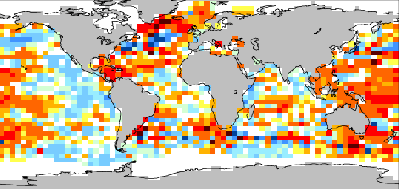|
Ocean Data Support Global Warming
Projections
By J.R. Pegg
WASHINGTON, DC, April 29, 2005 (ENS) –
A new study of ocean temperatures provides further
evidence that human activities are warming the planet,
scientists said Thursday. The Earth is absorbing more
energy from the Sun than it is emitting back into space,
according to the new study, and the magnitude of
imbalance cannot be explained by natural variability.
Lead author James Hansen, director of NASA’s
Goddard Institute for Space Studies, called the research
the "smoking gun" that should put to rest any
lingering doubts about humanity’s role in global
warming.
The new study finds that the Earth's current energy
imbalance is large by historic standards - for every
square meter of surface area, the plant is absorbing
about one watt of energy from the Sun more than it is
radiating back out into space.

Dr. James Hansen, director of NASA’s Goddard
Institute for Space Studies, received the prestigious
Heinz Environment Award for his research on global
warming in 2001. (Photo courtesy NASA)
The researchers report this imbalance fits with computer
models that calculate climate change with human-made
greenhouse gases and atmospheric pollutants as the
driving force.
These pollutants, in particular carbon dioxide,
methane and particulate matter, block the Earth's
radiant heat from escaping into space, increasing
absorption of sunlight and trapping heat within the
atmosphere.
There is little doubt the planet is warming - the
global average temperature increased about one degree
Fahrenheit over the past century.
The study shows that "our estimates of the
human-made and natural climate forcing agents are about
right, and they are driving the Earth toward a warmer
climate," Hansen said.
"There can no longer be substantial doubt that
human-made gases are the cause of most observed
warming," he said.
The findings of the 15 member research team were
published Thursday by the journal "Science."

This map shows observed energy imbalances in the top
750 meters (2,461 feet) of the world’s oceans from
1993-2003. Areas where there was an energy surplus are
shown in shades of yellow to red, while areas where
there was an energy deficit are in shades of green to
purple. (Map courtesy Jim Hansen et. al., Goddard
Institute for Space Studies)
The study, which relied on temperature data from
satellites and some 1,800 ocean buoys and floats,
illustrates the lag in the ocean’s response to
increased radiation.
Rather than showing an immediate temperature
increase, the ocean traps the heat within its depths –
a phenomenon known as "thermal inertia."
This means there is an additional global warming of
about one degree Fahrenheit (0.6 Celsius) "in the
pipeline" that will show in overall ambient
temperature this century, according to the research
team, even if humanity stopped emitting new greenhouse
gases immediately.
Humanity primarily produces greenhouse gases by the
combustion of fossil fuels, such as coal and oil, and
all indications are that emissions will continue to rise
for the foreseeable future.
Developing nations, in particular China and India,
are predicted to boost their emissions as their
economies continue to grow, and the United States, which
is responsible for more than a quarter of humanity’s
greenhouse gas emissions, has balked at mandatory
reductions.

Sea levels are rising due to global warming, studies
show. Here, a cargo ship approaches the coast of
England. (Photo by Ian Britton courtesy FreeFoto)
Barring dramatic efforts to curb emissions, scientists
predict temperatures could rise over the next century
from 3.6 to 20 degrees Fahrenheit (2 to 11 degrees
Celsius).
Such increases could spin the climate system
"out of our control," the researchers said, in
particular as sea levels rise from melting ice sheets in
Greenland and Antarctica.
Sea levels rose some 1.26 inches (3.2 centimeters) in
the past decade, Hansen said, an increase twice the rate
of the last century.
The study led by Hansen on the Earth’s energy
imbalance comes on the heels of new research from the
British Antarctic Survey (BAS) that finds more than 200
coastal glaciers in Antarctica are in retreat because of
higher temperatures.
The BAS study, published last week in
"Science," reports that 87 percent of the 244
marine glaciers that drain inland ice on the Antarctic
peninsula have retreated in the last 50 years and that
average retreat rates have accelerated in recent years.
|